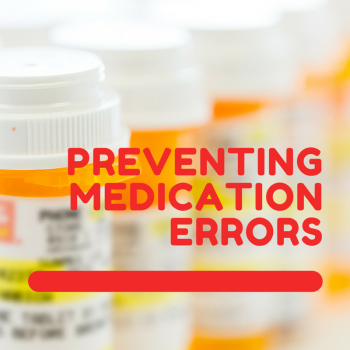A Nurse Aide, an Emergency Room Clerk, and a Patient
I have great appreciation for doctors and nurses, hospitals, and patients. In high school I worked as a nurse aide in a convalescent home. I fed, dressed, and showered elderly patients, many of them immobile. I shaved gentlemen's facial stubble and polished ladies' fingernails. In college and in graduate school, I worked as an emergency room clerk. I witnessed a lot, including amazing doctors and nurses caring for patients and saving lives. I have also been a patient. First, when I had an appendectomy at age eight and then when I gave natural childbirth twice. All were pleasant experiences. My time as a nurse aide and an emergency room clerk taught me about illnesses, diseases, tests, diagnoses, allergies, treatment, medical jargon, pharmaceuticals, and patient care.
I never imagined that, one day I would be a hospital patient who would experience not only one serious surgical error but also many medication errors during the first fifteen days of a twenty-six day hospital stay. Good doctors, nurses, and other health care professionals made unintentional but potentially life threatening and preventable mistakes. From a patient perspective, I offer ways hospital healthcare professionals can avoid life-threatening medication errors and prevent patients from enduring unacceptable emotional stress and trauma.
The Trauma of Medication Errors
A week after my laparoscopic hysterectomy, I was in the emergency room suffering from excruciating abdominal pain and severe nausea. Drowsy and not alert from the pain medication, I was escorted in a wheel chair with my husband Jon by my side to the CAT scan room. A technician offered me a clear plastic cup containing what appeared to be water. My husband asked what was in the plastic cup. The clear liquid was CAT scan dye (iodine).
Immediately, my husband intervened and protested I am allergic to CAT scan dye. The technician replied that it was "only a little." It was only after my husband insisted that she read my patient chart for my allergies, that she poured the dye down the drain. Thank God my husband and best advocate reacted so quickly when I could not. A CAT scan without dye (without contrast) revealed I had a small bowel obstruction.
While an in-patient after the surgery to unkink the obstruction, I developed edema on my feet and ankles. The doctor ordered Lasix, a diuretic. How harmful can a diuretic be? Very harmful and even life threatening if the diuretic contains sulfa.
As soon as the nurse inserted the syringe in the vein of my right arm, I had a severe reaction. I violently jerked my body forward and began screaming at the top of my lungs. I was burning and on fire. I was screaming "I'm dying." My husband could only helplessly watch in horror. The nurse was surprised I had such a severe reaction. She said she was not aware of any adverse reaction to Lasix because it's "just a diuretic."
Two days later, another doctor stopped by to check in on me. I told him what had happened when I was given Lasix. He calmly asked if I was allergic to sulfa. I said yes, and he said Lasix is a sulfa drug. Lasix was ordered by a doctor, dispensed by the hospital pharmacist, and administered by the nurse. No one checked my chart or the electronic patient file in the patient computer in my room to see that I am allergic to sulfa.
These medication errors were preventable. All my allergies were listed in my patient chart. I immediately went into anaphylactic shock during my first CAT scan with dye when I was nineteen. In my twenties, I discovered I was allergic to sulfa.
I was also given Cipro for a urinary tract infection (UTI) after a nephrostomy tube was inserted in my left kidney on day seventeen of my hospital stay. Cipro and all fluoroquinolones should not be prescribed to athletes and runners. I suffered Cipro toxicity and was diagnosed with rheumatoid arthritis. I should have never been given Cipro, a black box drug.
Preventing Medication Errors
To prevent medication errors, all entrusted in a patient's care - doctors, nurses, technicians, and pharmacists - must:
1) Always very carefully review and check the patient's chart for allergies every single time they have contact with the patient. My patient wristband only indicated I have allergies but did not list them.
2) Always ask the patient for their drug allergy history. If the patient is not alert or lucid, speak to a family member or the patient's advocate.
3) Have knowledge of the medications, and their side effects and adverse reactions before prescribing, ordering, and administering them.
4) Determine if the patient is or is not a candidate for said medication. As an ultrarunner, I am not a candidate for Cipro. I should have been prescribed an antibiotic that does not contain sulfa to treat my UTI.
Be Your Own Advocate and Have A Patient Advocate
I mistakenly assumed that all entrusted in my care reviewed my patient chart for my allergy history. I joined the approximately 1.5 million people who suffer unnecessarily from medical errors every year. Medication errors can occur, especially when there is no known history of allergies to medication. However, when a patient provides h/her entire medication allergy history, preventable medication errors should not occur.
My knowledge of my allergies to certain drugs was not enough to prevent me from enduring unnecessary suffering and trauma. I can only imagine what might have happened if my husband and advocate had not been with me, and I had ingested the CAT scan dye. Today I carry a medical alert bracelet engraved with my medication allergies.
